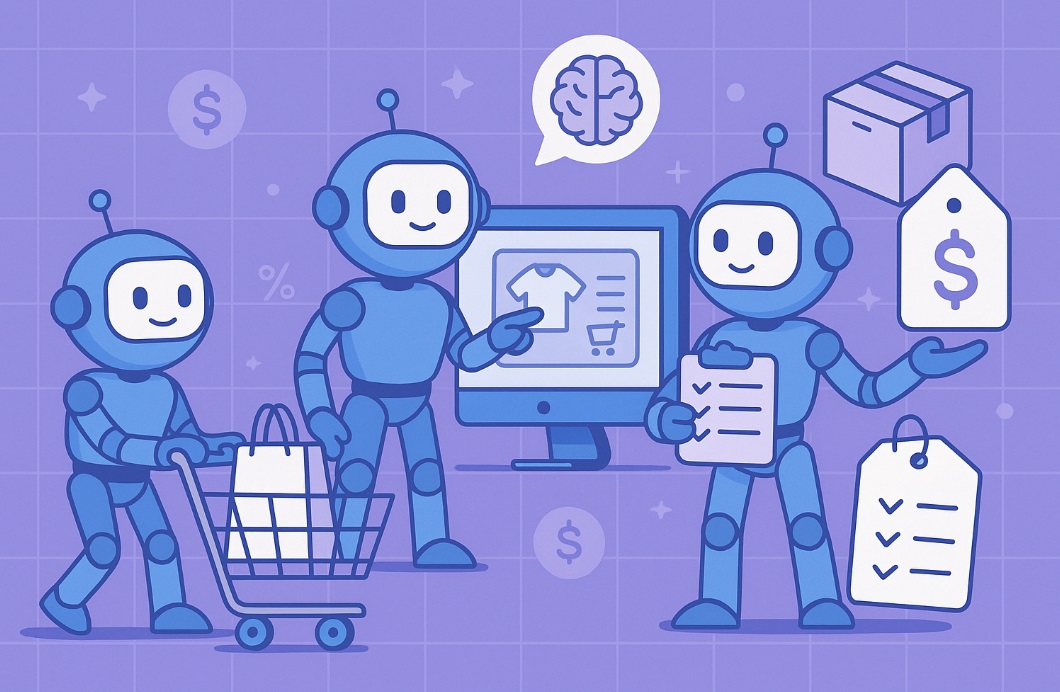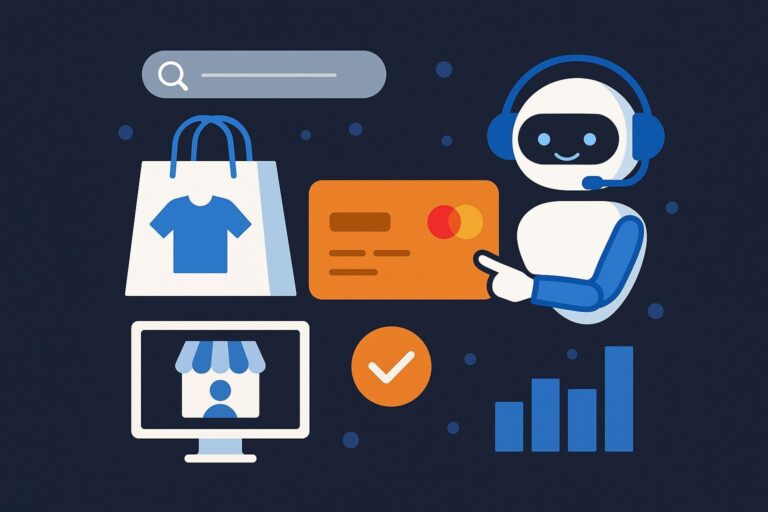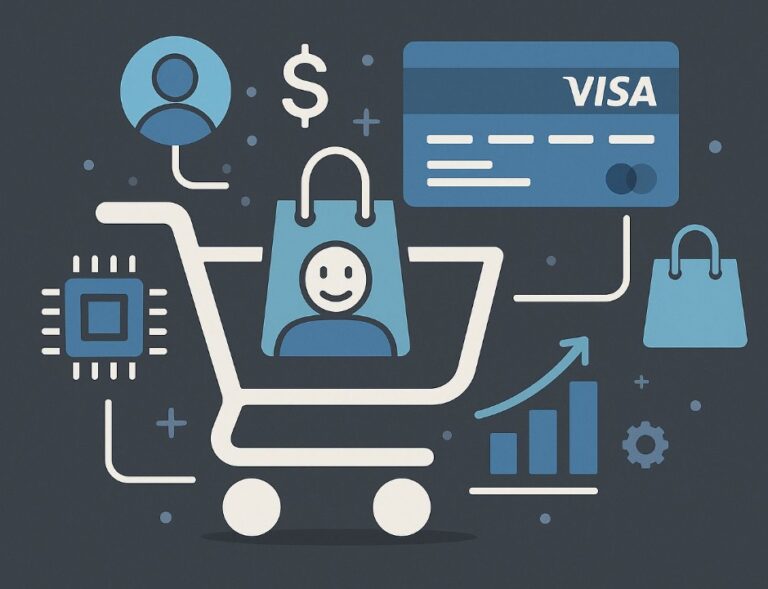Kibo Agentic Commerce solution is dubbed as “the future of intelligent, autonomous digital commerce”, offering pre-trained, API-first AI agents built for the sole purpose of executing ecommerce tasks instead of humans.
In a competitive space with major players like Visa, Amazon, Mastercard, and others, Kibo Commerce plans to stand out by offering more than the competition. What exactly is that? Let’s find out.
What Is Kibo Agentic Commerce?
Kibo is a composable commerce platform, and their Agentic Commerce is a multi-agent AI system built on Google Cloud’s Gemini and Vertex AI. It comes with a full suite of pre-trained agents designed specifically for agentic commerce operations. These include:
- Shopper agents
- Customer service agents
- Promotional and merchandising agents
- Order management system agents
- Forecasting and analytics agents
- Developer agents
These agents are pre-trained on industry-specific data across retail, wholesale, B2B, B2C, and DTC sectors, so businesses can deploy them immediately without custom AI training. Their key functionalities include:
- Conversational commerce: Agents engage shoppers via chat or voice to provide product info, personalized recommendations, real-time inventory checks, and frictionless checkout (e.g., add-to-cart and pay) in one conversation.
- Automated fulfillment and support: Other agents handle backend logistics – routing orders to warehouses, processing returns or refunds, and customer service without manual effort.
- Marketing and merchandising: Specialized agents can generate targeted promotions, optimize product listings, and forecast demand using AI-driven analytics and historical data.
Who Is Kibo Agentic Commerce Built For?
Kibo Agentic Commerce is designed for enterprise-level businesses across retail, wholesale, manufacturing, and distribution, serving both B2C and B2B ecommerce markets. The platform is built to help these companies modernize their commerce operations with agentic AI that drives real results.
According to data, early adopters have already seen around 30% increases in cart conversions, average order value, and customer lifetime value, along with up to 50% reductions in service costs after adopting Kibo.
Now, the use cases Kibo highlights are practical and revenue-focused.
- Businesses can deploy agents to improve product discovery and checkout experiences, reducing friction and boosting conversions.
- AI-powered customer service agents help cut down on manual support work, while promotional agents can automate targeted offers to drive sales.
- Fulfillment and inventory management agents work behind the scenes to speed up delivery and optimize stock allocation.
As we said, Kibo’s agents are pre-tuned for different business models, meaning companies in industries like home goods, hardware, and specialty retailers can deploy Kibo’s agentic solutions tailored to their specific needs, without needing to train the AI from scratch.
What Makes Kibo Stand Out?
Kibo’s Agentic Commerce competes with leading brands like Salesforce and Shopify, which are also adding AI features to their ecosystems, as well as with specialists building shopping-focused agents. So, what makes it stand out?
Firstly, Kibo positions itself as a “commerce-first” AI platform, setting itself apart from “generic chatbot builders” or AI toolkits. Instead of offering blank-slate AI that companies must customize extensively, Kibo delivers ready-to-use agents that are already optimized for smarter commerce outcomes.
In simpler terms, Kibo is delivering a plug-and-play multi-agent system that works out of the box, positioning itself as one of the fastest ways for brands to adopt agentic commerce at scale.
How Does Kibo’s Agentic Commerce Enhance B2B Experience?
We all know that B2B commerce comes with its own set of challenges: large product catalogs, complex pricing structures, and multi-layered approval processes. Thankfully, Kibo designed its Agentic Commerce platform specifically to meet these needs. According to the company, the platform is “engineered specifically to tackle the unique demands of the B2B environment,” but what exactly does that mean?
In a typical B2B scenario, Kibo’s Shopper Agent plays the role of a knowledgeable sales assistant. It can recall a customer’s complete order history, configure bulk orders, and navigate through negotiated pricing agreements within a single conversational flow.
It can also analyze long documents such as spec sheets and pricing lists, or scan lengthy email threads from procurement teams to make accurate, context-aware decisions on the spot.
Beyond order handling, Kibo’s agents manage context-specific pricing and customer histories to deliver hyper-personalized buying journeys that were previously difficult to automate.
The platform also simplifies traditionally manual workflows, such as pricing rules, order routing, and demand forecasting, by letting agents take over those tasks.
To sum up, Kibo offers greater agility, lower operational costs, and more intuitive customer experiences through efficient workflows, personalized customer portals, and smarter, data-driven decision-making.
How Does It Affect B2C Journeys?
On the B2C side, Kibo’s Shopper Agent can act as a 24/7 personal sales assistant, reshaping how customers browse and buy. Whether through chat or voice, the agent answers product questions, checks inventory in real time, and can even add items to the cart and complete the checkout process, without the shopper ever leaving the conversation.
For example, your customer may ask, “Can this jacket be delivered by Friday?” The agent immediately checks shipping options, confirms availability, adds the product to the cart, and completes the purchase. Kibo team reports that pilot deployments have seen up to a 30% increase in cart conversions, driven by this frictionless buying flow.
However, the experience doesn’t end at checkout. Post-purchase, customers can check on order status or initiate returns directly through the same conversational interface. The agent processes these requests in real time, reducing the burden on customer service teams and speeding up resolution times.
According to Kibo’s data, brands using these agents have seen notable improvements in both operational efficiency and customer satisfaction scores, with double-digit gains reported in some cases.
Additionally, because the interaction is dynamic and personalized, the agent can offer relevant product upsells or exclusive promotions during the conversation, helping improve customer experience and drive higher average order values.
Who’s Kibo’s Competition in the Agentic Commerce Space?
Kibo doesn’t really have a direct competitor at the moment. However, there are more than a few agentic solutions available to businesses today:
Visa Intelligent Commerce
Visa’s Intelligent Commerce equips AI agents to securely process transactions, manage subscriptions, and optimize checkout flows to enable frictionless, automated payments directly between consumer and merchant agents.
PayPal Agent Toolkit
PayPal’s Agent Toolkit lets brands build autonomous payment agents that execute purchases, handle refunds, and manage user wallets, creating seamless agentic commerce flows without human intervention.
Mastercard Agent Pay
Mastercard’s Agent Pay empowers AI agents to initiate and authorize payments securely, supporting autonomous checkouts, recurring billing, and machine-to-machine commerce scenarios.
Stripe Agent Toolkit
Stripe’s Agent Toolkit provides APIs for building AI-driven payment, fraud prevention, and checkout agents, enabling fully automated purchase journeys across web and app environments.




